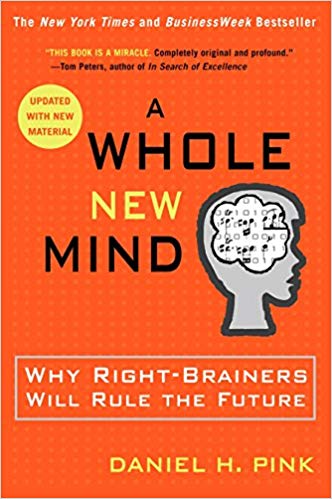 I am a big fan of Dan Pink’s writing, and the first book that grabbed me was A Whole New Mind: Moving from the Information Age to the Conceptual Age.
I am a big fan of Dan Pink’s writing, and the first book that grabbed me was A Whole New Mind: Moving from the Information Age to the Conceptual Age.
Growing up we were told the professions with the most status, respect, and earning potential were ones like lawyers, doctors, engineers, or accountants. Younger readers may add information technology to that list. While these are still the high-status careers today and have been the drivers of both the service economy and the information or knowledge economy, Dan Pink argues that the future driver of economic growth and value will be substantially different.
To demonstrate his point, he uses the metaphor of the human brain. The drivers of the old economy were distinctively biased towards the strengths of the left hemisphere of our brains: quantitative, sequential, rational, and analytical (breaking things down into component parts). People who excelled in these areas succeeded in the high-status careers and led the economy.
Pink provides compelling evidence (that would appeal to the left brain) that these qualities, while obviously necessary, will not be the drivers for the foreseeable future. Because of outsourcing, automation, and the incredible abundance we have in this country, simply building a technically better mousetrap will no longer suffice. Consumers are now demanding right-brain oriented elements, like a good story, artful design, fun, or a deeper meaning.
Beyond stimulating conversations about business strategy, I think this book also provides a cutting-edge model for internal organizational effectiveness. Workplaces that emphasize and value more right-brained qualities will become more attractive and more effective. The challenge is then to develop, both personally and organizationally, these right-brain qualities, and the book provides resources and suggestions for how to do that. We all use both halves of our brain, and the years of left-brain oriented work does not mean you cannot quickly and effectively develop the other side.
